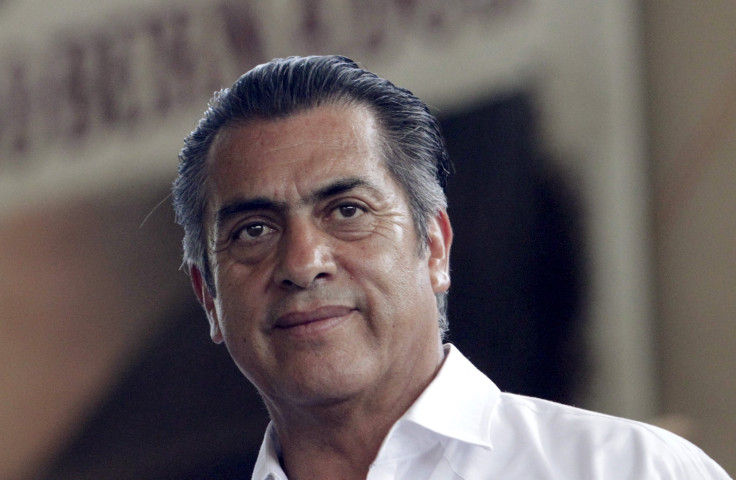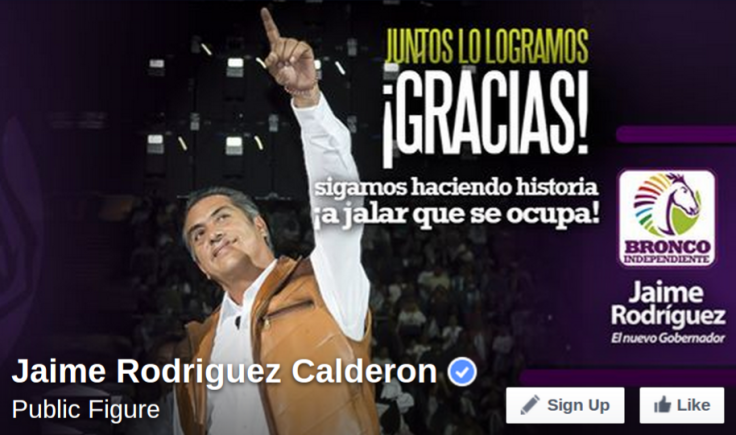
Jaime "El Bronco" Rodríguez Calderon, made history on Sunday, trouncing candidates of the PRI and PAN parties to become Mexico’s independent governor. The 57-year-old agricultural engineer reportedly relied on social media instead of paid campaign ads, producing high-quality campaign videos and pushing them out through social networks. Amidst a deepening political crisis that's driving some to apathy and others to anarchy, El Bronco offered voters a constructive alternative to Mexico's stagnant bipartisan political system. Local media called the victory a "watershed moment" and a victory for democracy."
"Nuevo León will be the beginning of this second Mexican revolution which will change the consciousness and the attitude of many," El Bronco told a crowd of supporters.
One Univision reporter called it a "watershed moment" for the country and for democracy.
Rodríguez' nickname, El Bronco, encapsulates much of what made the candidate special. First, he's a rancher, with a humble background and a cowboy affect. Second, his supporters say that, like a wild horse, he's "untamed" by convention. As the maverick mayor of a municipality near Monterrey, he reportedly shrugged off the demands of Los Zetas, a powerful and ruthless drug cartel.
Assassination Attempts, Family Harmed
"One dead son, one kidnapped two-year-old daughter and 2,800 bullet holes in my truck," was essentially El Bronco’s political platform, the Telegraph observed.
After taking on Los Zetas, Rodríguez' 22-year-old son was killed. While some newspapers have contested the reports, his toddler daughter was kidnapped for a number of hours and returned. “Era una noche cabrona,” -- that was a shitty night for me -- he said of the kidnapping. (El Bronco bucks social convention, too, openly cursing about practically every topic.)
“The Zetas want to kill me because I don’t make an a** of myself,” he told reporters after surviving his own assassination attempt that involved multiple gunmen.
Social Media Advocate
One of the reasons that El Bronco pissed off the Zetas so much was by cracking down on organized crime, specifically drug dealing and racketeering. He engineered new policing by creating a special anti-gang police unit and informant network. Then, he did something very radical: he gave out his phone number.
“I think that we can stop violence using social media,” he says, in an interview included in a 75-minute fluff documentary entitled Jaime Rodríguez: A Fearless Bronco. (Replete with testimonials, music videos, and historical reenactments of a young Jaime El Bronco fetching water with buckets to a somber piano score, the 2014 film is the 21st-century equivalent of a revolutionary folks song). “Thanks to Facebook there are no secrets, and people will be more responsible.”
He’s half-jokingly told crowds that they can use Facebook to find out what their kids are up to, and if their spouses are cheating on them.
“People started texting me the names of criminals. And I’d say ‘send a photo,’ and they would. To me. Not to the police. Me. And we started finding those criminals on Facebook [and arresting them].”
El Bronco also responded to people’s more basic requests, like broken streetlights. He made business with his personal cellphone number printed in giant letters and handed them out to everyone he met (he reads out his number in “Fearless Bronco,” swearing he’ll never change it). When top city officials declined to do the same, he printed their personal numbers on the back of his business cards.
“They told me ‘no, no,’ so I said ‘f**k them.’ If I don’t sleep, they don’t sleep either.”
Social media wasn’t just the key El Bronco’s governing style, but his campaign strategy as well. A member of the PRI for 30 years, he found himself building a new model when he decided to run as an independent. Local media reportedly snubbed him, practically boycotting his events and focusing on his rivals. Since he wasn’t affiliated with a party, he didn’t get access to the free media spots mandated by campaign laws. Yet he won anyway, bucking what he sees as an opportunistic and formulaic political scene.
“Take a photo with an old lady so it goes on TV. Take another one with a guy in a wheelchair... this has perverted politicians,” he says the “Fearless Bronco” film.

Are “Broncos” The Way Forward?
Three significant things happened in Mexico on Sunday which arguably mark three paths forward for Mexico in its political crisis. The PRI did pretty well in congressional elections and maintained their grasp on the lower house despite high levels of satisfaction with the Enrique Peña Nieto administration; voter turnout was about 50 percent, marking deep apathy towards the current political scene. Also, Protesters boycotting what they described as corruption in every party burned ballots and shut down voting in Guerrero; a push for anarchy over corruption. Lastly, El Bronco won as an independent who earned his stripes against cartels.
“This clearly shows the people’s dissatisfaction with the behavior of political parties,” Gabriel Casillas, a top Mexican economist told Bloomberg in relation to the El Bronco victory. “Political parties will have to rethink their strategies. We could see a strong individual, independent candidate run for president in 2018.”
“This is a clear message that the public is fed up with the political parties,” political analyst Jesus Cantú told the WSJ “This is historic.”
El Bronco also sees his style as an inevitable model for the future of Mexican politics.
“Politicians haven't seen the wave that's coming, this tsunami. If they want to survive, they’ll have to get a surfboard and ride this wave, or they’re just gonna get bowled over.”
© 2025 Latin Times. All rights reserved. Do not reproduce without permission.



